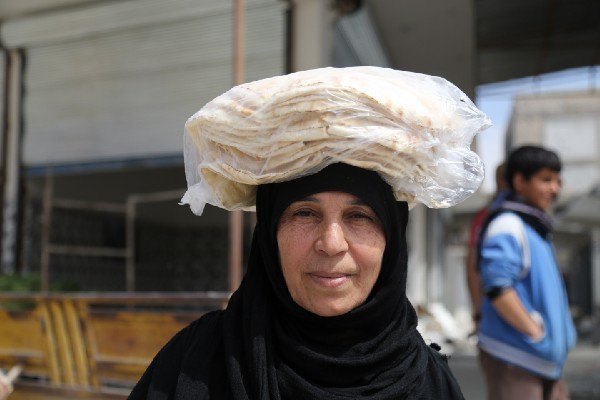Starting Anew in Raqqa

A year ago, Jamila Mohamed fled to the town of Ain Issa to escape the brutality of ISIS rule. Last month, she finally returned home to Raqqa in northeastern Syria.

WFP/Marwa Awad
Her city, liberated in October, was free. But when she arrived, she found her home destroyed by the shelling of war. Everything had been looted.
“I have nothing now,” she said. “I am in debt just to buy bread and vegetables.”
Now, Jamila, a 70-year-old woman, has no choice but to live among the ruins. She uses a small generator for electricity and is reliant on the World Food Programme (WFP) for food.
As civil war enters its eighth year in Syria, the liberation of Raqqa is a new breakthrough in critical access to hungry people in need.
After conducting hundreds of airlifts of food inside Raqqa governorate to deliver lifesaving aid to families during the reign of ISIS, WFP has shifted its logistics effort to deliver food via truck convoys. Every month, the humanitarian agency is delivering assistance to 30,000 people like Jamila inside the city.
Last month, WFP conducted its first food distribution to the area since 2014. Families eagerly anticipated bags of grain, oil, bread, and beans, and WFP hopes it will encourage more Syrians to come home as the city rebuilds.
“Bread is a staple of life everywhere across Syria,” said Jakob Kern, WFP’s Country Director in Syria. “In Raqqa, almost all public bakeries in the city have been destroyed.”
During a recent visit, Kern estimated that two-thirds of Raqqa had been destroyed in the fighting. Rows of abandoned buildings barely stand alongside mounds of rubble and the charred remains of vehicles on the city’s street corners. There are few jobs available, which means many are unable to afford the food they need to survive.
The destruction also compromised the city’s infrastructure—there is no clean water, electricity or phone connectivity. Landmines and unexploded ordinances threaten the lives of people on a daily basis. Only some trade routes have been cleared, allowing for minimal goods to reach the city.
Before its liberation, WFP was able to reach rural areas north of Raqqa with food assistance by a newly opened land route, providing access to areas unreachable for years.
The access allowed WFP to expand its regular food deliveries to Raqqa, delivering food every month to nearly 200,000 people displaced in eight hard-to-reach locations inside Raqqa governorate, as well as other areas in nearby governorates.
“Land access is always the best option for WFP to reach Syrians in need of assistance …” Kern said. “We are now reaching more families and people returning to their homes who need our help with regular food deliveries.”
WFP is exploring the creation of a number of livelihood projects that will improve families’ self-reliance and rehabilitate parts of Raqqa. WFP will also continue to support families who remain displaced from Raqqa in nearby camps.
Across Syria, WFP delivers food assistance every month across all of Syria’s 14 governorates. In addition to its emergency operation, WFP is also scaling up support for long-term recovery by focusing on livelihoods, nutrition, and improving access to primary education for children in Syria by providing school meals.




